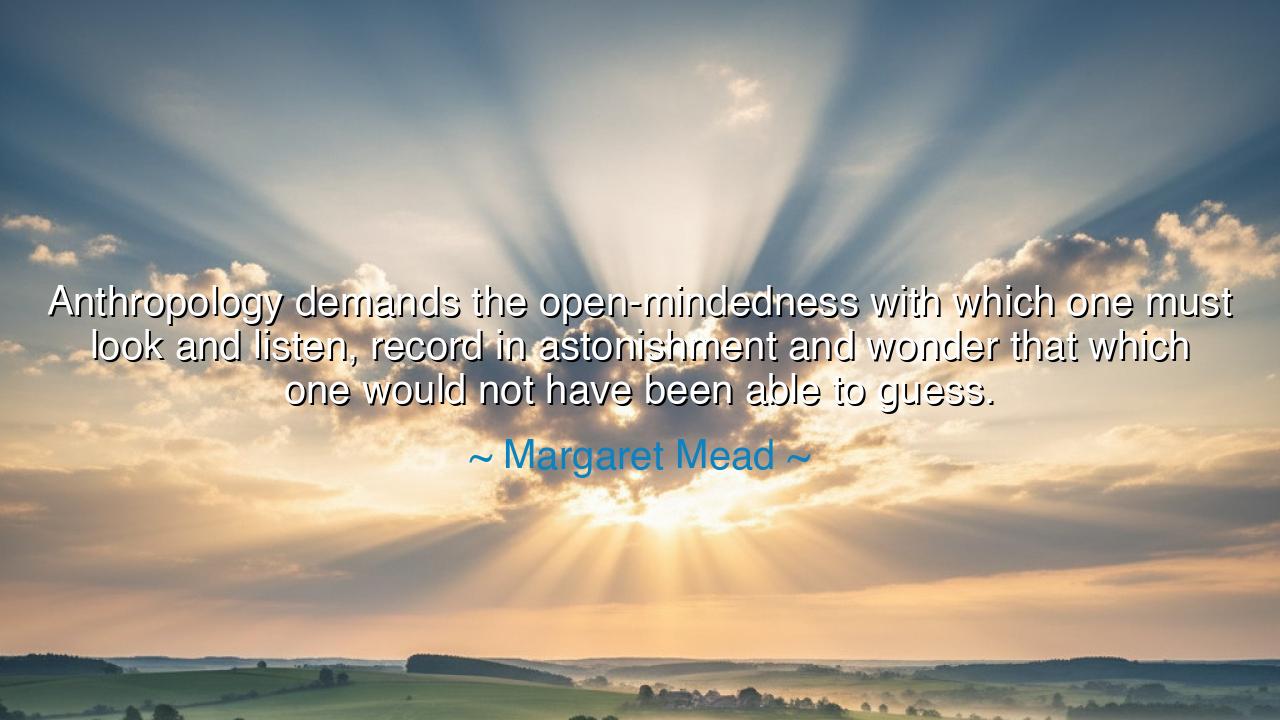
Anthropology demands the open-mindedness with which one must look
Anthropology demands the open-mindedness with which one must look and listen, record in astonishment and wonder that which one would not have been able to guess.






"Anthropology demands the open-mindedness with which one must look and listen, record in astonishment and wonder that which one would not have been able to guess." These words from the esteemed Margaret Mead speak to the very soul of human exploration and understanding. Anthropology, the study of human societies and cultures, is not simply an intellectual pursuit; it is a profound journey into the heart of humanity, one that requires open-mindedness, humility, and a willingness to embrace the unknown. To truly understand others, we must first learn to look with wonder and listen with the intent to understand—not with preconceived notions or judgments, but with a heart that is open to the surprises that lie hidden in every culture and every human expression.
In the ancient world, there were those who embarked upon journeys to understand the peoples and customs of lands far and wide. The great Herodotus, often called the "Father of History," traveled through the ancient world, chronicling the customs and beliefs of the civilizations he encountered. Like Mead, Herodotus did not approach these peoples with the intent to conquer or change them but to understand and record their ways. He wrote of the Egyptians, Persians, and Greeks with an open mind, seeing their ways not as inferior or strange, but as part of the vast tapestry of human existence. Herodotus’s work was filled with astonishment and wonder, for he was keenly aware that the mysteries of human culture were not to be explained away but to be understood with the deepest respect and curiosity.
The same spirit of open-mindedness is embodied in Margaret Mead’s work, especially her groundbreaking studies of the cultures of the South Pacific. She ventured into the unknown territories of Samoa, seeking to understand the lives of the people there and their social structures. The Samoan culture was far removed from the norms of Western society, and yet Mead did not seek to impose her own judgments. She listened, observed, and recorded, recognizing that in the patterns of Samoan life, there was a profound wisdom that could not be reduced to mere logic or conventional understanding. Mead did not approach these people as a conqueror or a critic; rather, she approached them as a student of life, amazed by their uniqueness and the ways in which their culture differed from her own.
Anthropology, then, is not the study of people to prove a theory or confirm an assumption. It is the humble art of observation, the ability to walk into a foreign world and find wonder in the unfamiliar. Mead teaches us that we must record, not just what we already know or what we expect, but what we could never have anticipated. To be an anthropologist is to open oneself to the unfathomable richness of human life, to embrace the idea that there are endless ways of being in this world, each worthy of respect and understanding. It is the kind of open-mindedness that allows one to be astonished by the strangeness of the world while simultaneously finding beauty in that very strangeness.
This spirit of curiosity and wonder is essential not just for anthropologists but for all of humanity. We live in a world where it is far too easy to fall into the trap of judgment and assumption. We encounter the other, the different, the unknown, and we rush to categorize it, to label it, to simplify it into something that fits our own limited understanding. But true wisdom lies in the willingness to be astonished, to look and listen with the mind of a true seeker. Just as the great explorers of the ancient world once ventured into lands unknown to record what they did not understand, so too must we approach the people and cultures around us with open hearts and minds.
The lesson that Mead imparts to us is clear: to understand others, we must first be willing to lay aside our preconceived notions and open ourselves to the unfamiliar. Anthropology is not just an academic discipline; it is a way of being in the world. It is about learning to listen deeply, to hear the stories that others have to tell, and to record them not with judgment, but with awe and respect. It teaches us that in the diversity of human experience lies a richness that cannot be measured by simple logic or reason but must be experienced with a spirit of wonder.
In your own life, let this lesson guide you. Approach those you meet with an open heart. Do not rush to judgment or to impose your own way of thinking on them. Instead, take the time to listen and observe, to find astonishment in their uniqueness. Every person you encounter is a world unto themselves, and their story is one that deserves to be heard and respected. Whether in your personal relationships, your work, or your understanding of the world, let Mead’s spirit of curiosity and open-mindedness shape your responses. As you walk through life, may you too record with awe and reverence the beauty of all that is new, unfamiliar, and waiting to be understood.






AAdministratorAdministrator
Welcome, honored guests. Please leave a comment, we will respond soon